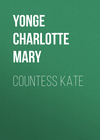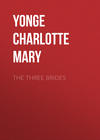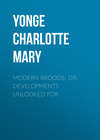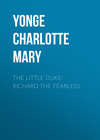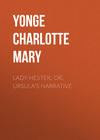Loe raamatut: «A Book of Golden Deeds», lehekülg 11
WHAT IS BETTER THAN SLAYING A DRAGON
1332
The next story we have to tell is so strange and wild, that it would seem better to befit the cloudy times when history had not yet been disentangled from fable, than the comparatively clear light of the fourteenth century.
It took place in the island of Rhodes. This Greek isle had become the home of the Knights of St. John, or Hospitaliers, an order of sworn brethren who had arisen at the time of the Crusades. At first they had been merely monks, who kept open house for the reception of the poor penniless pilgrims who arrived at Jerusalem in need of shelter, and often of nursing and healing. The good monks not only fed and housed them, but did their best to cure the many diseases that they would catch in the toilsome journey in that feverish climate; and thus it has come to pass that the word hospitium, which in Latin only means an inn, has, in modern languages, given birth, on the one hand, to hotel, or lodging house, on the other, to hospital, or house of healing. The Hospital at Jerusalem was called after St. John the Almoner, a charitable Bishop of old, and the brethren were Hospitaliers. By and by, when the first Crusade was over, and there was a great need of warriors to maintain the Christian cause in Jerusalem, the Hospitaliers thought it a pity that so many strong arms should be prevented from exerting themselves, by the laws that forbade the clergy to do battle, and they obtained permission from the Pope to become warriors as well as monks. They were thus all in one—knights, priests, and nurses; their monasteries were both castles and hospitals; and the sick pilgrim or wounded Crusader was sure of all the best tendance and medical care that the times could afford, as well as of all the ghostly comfort and counsel that he might need, and, if he recovered, he was escorted safely down to the seashore by a party strong enough to protect him from the hordes of robber Arabs. All this was for charity's sake, and without reward. Surely the constitution of the Order was as golden as its badge—the eight-pointed cross—which the brethren wore round their neck. They wore it also in white over their shoulder upon a black mantle. And the knights who had been admitted to the full honors of the Order had a scarlet surcoat, likewise with the white cross, over their armor. The whole brotherhood was under the command of a Grand Master, who was elected in a chapter of all the knights, and to whom all vowed to render implicit obedience.
Good service in all their three capacities had been done by the Order as long as the Crusaders were able to keep a footing in the Holy Land; but they were driven back step by step, and at last, in 1291, their last stronghold at Acre was taken, after much desperate fighting, and the remnant of the Hospitaliers sailed away to the isle of Cyprus, where, after a few years, they recruited their forces, and, in 1307, captured the island of Rhodes, which had been a nest of Greek and Mahometan pirates. Here they remained, hoping for a fresh Crusade to recover the Holy Sepulcher, and in the meantime fulfilling their old mission as the protectors and nurses of the weak. All the Mediterranean Sea was infested by corsairs from the African coast and the Greek isles, and these brave knights, becoming sailors as well as all they had been before, placed their red flag with its white cross at the masthead of many a gallant vessel that guarded the peaceful traveler, hunted down the cruel pirate, and brought home his Christian slave, rescued from laboring at the oar, to the Hospital for rest and tendance. Or their treasures were used in redeeming the captives in the pirate cities. No knight of St. John might offer any ransom for himself save his sword and scarf; but for the redemption of their poor fellow Christians their wealth was ready, and many a captive was released from toiling in Algiers or Tripoli, or still worse, from rowing the pirate vessels, chained to the oar, between the decks, and was restored to health and returned to his friends, blessing the day he had been brought into the curving harbour of Rhodes, with the fine fortified town of churches and monasteries.
Some eighteen years after the conquest of Rhodes, the whole island was filled with dismay by the ravages of an enormous creature, living in a morass at the foot of Mount St. Stephen, about two miles from the city of Rhodes. Tradition calls it a dragon, and whether it were a crocodile or a serpent is uncertain. There is reason to think that the monsters of early creation were slow in becoming extinct, or it is not impossible that either a crocodile or a python might have been brought over by storms or currents from Africa, and have grown to a more formidable size than usual in solitude among the marshes, while the island was changing owners. The reptile, whatever it might be, was the object of extreme dread; it devoured sheep and cattle, when they came down to the water, and even young shepherd boys were missing. And the pilgrimage to the Chapel of St. Stephen, on the hill above its lair, was especially a service of danger, for pilgrims were believed to be snapped up by the dragon before they could mount the hill.
Several knights had gone out to attempt the destruction of the creature, but not one had returned, and at last the Grand Master, Helion de Villeneuve, forbade any further attacks to be made. The dragon is said to have been covered with scales that were perfectly impenetrable either to arrows or any cutting weapon; and the severe loss that encounters with him had cost the Order, convinced the Grand Master that he must be let alone.
However, a young knight, named Dieudonne de Gozon, was by no means willing to acquiesce in the decree; perhaps all the less because it came after he had once gone out in quest of the monster, but had returned, by his own confession, without striking a blow. He requested leave of absence, and went home for a time to his father's castle of Gozon, in Languedoc; and there he caused a model of the monster to be made. He had observed that the scales did not protect the animal's belly, though it was almost impossible to get a blow at it, owing to its tremendous teeth, and the furious strokes of its length of tail. He therefore caused this part of his model to be made hollow, and filled with food, and obtaining two fierce young mastiffs, he trained them to fly at the under side of the monster, while he mounted his warhorse, and endeavored to accustom it likewise to attack the strange shape without swerving.
When he thought the education of horse and dogs complete, he returned to Rhodes; but fearing to be prevented from carrying out his design, he did not land at the city, but on a remote part of the coast, whence he made his way to the chapel of St. Stephen. There, after having recommended himself to God, he left his two French squires, desiring them to return home if he were slain, but to watch and come to him if he killed the dragon, or were only hurt by it. He then rode down the hillside, and towards the haunt of the dragon. It roused itself at his advance, and at first he charged it with his lance, which was perfectly useless against the scales. His horse was quick to perceive the difference between the true and the false monster, and started back, so that he was forced to leap to the ground; but the two dogs were more staunch, and sprang at the animal, whilst their master struck at it with his sword, but still without reaching a vulnerable part, and a blow from the tail had thrown him down, and the dragon was turning upon him, when the movement left the undefended belly exposed. Both mastiffs fastened on it at once, and the knight, regaining his feet, thrust his sword into it. There was a death grapple, and finally the servants, coming down the hill, found their knight lying apparently dead under the carcass of the dragon. When they had extricated him, taken off his helmet, and sprinkled him with water, he recovered, and presently was led into the city amid the ecstatic shouts of the whole populace, who conducted him in triumph to the palace of the Grand Master.
We have seen how Titus Manlius was requited by his father for his breach of discipline. It was somewhat in the same manner that Helion de Villeneuve received Dieudonne. We borrow Schiller's beautiful version of the conversation that took place, as the young knight, pale, with his black mantle rent, his shining armor dinted, his scarlet surcoat stained with blood, came into the Knights' Great Hall.
'Severe and grave was the Master's brow,
Quoth he, 'A hero bold art thou,
By valor 't is that knights are known;
A valiant spirit hast thou shown;
But the first duty of a knight,
Now tell, who vows for CHRIST to fight
And bears the Cross on his coat of mail.'
The listeners all with fear grew pale,
While, bending lowly, spake the knight,
His cheeks with blushes burning,
'He who the Cross would bear aright
Obedience must be learning.'
Even after hearing the account of the conflict, the Grand Master did not abate his displeasure.
'My son, the spoiler of the land
Lies slain by thy victorious hand
Thou art the people's god, but so
Thou art become thine Order's foe;
A deadlier foe thine heart has bred
Than this which by thy hand is dead,
That serpent still the heart defiling
To ruin and to strife beguiling,
It is that spirit rash and bold,
That scorns the bands of order;
Rages against them uncontrolled
Till earth is in disorder.
'Courage by Saracens is shown,
Submission is the Christian's own;
And where our Saviour, high and holy,
Wandered a pilgrim poor and lowly
Upon that ground with mystery fraught,
The fathers of our Order taught
The duty hardest to fulfil
Is to give up your own self-will
Thou art elate with glory vain.
Away then from my sight!
Who can his Saviour's yoke disdain
Bears not his Cross aright.'
'An angry cry burst from the crowd,
The hall rang with their tumult loud;
Each knightly brother prayed for grace.
The victor downward bent his face,
Aside his cloak in silence laid,
Kissed the Grand Master's hand, nor stayed.
The Master watched him from the hall,
Then summoned him with loving call,
'Come to embrace me, noble son,
Thine is the conquest of the soul;
Take up the Cross, now truly won,
By meekness and by self-control.'
The probation of Dieudonne is said to have been somewhat longer than the poem represents, but after the claims of discipline had been established, he became a great favorite with stern old Villeneuve, and the dragon's head was set up over the gate of the city, where Thèvenot professed to have seen it in the seventeenth century, and said that it was larger than that of a horse, with a huge mouth and teeth and very large eyes. The name of Rhodes is said to come from a Phoenician word, meaning a serpent, and the Greeks called this isle of serpents, which is all in favor of the truth of the story. But, on the other hand, such traditions often are prompted by the sight of the fossil skeletons of the dragons of the elder world, and are generally to be met with where such minerals prevail as are found in the northern part of Rhodes. The tale is disbelieved by many, but it is hard to suppose it an entire invention, though the description of the monster may have been exaggerated.
Dieudonne de Gozon was elected to the Grand Mastership after the death of Villeneuve, and is said to have voted for himself. If so, it seems as if he might have had, in his earlier days, an overweening opinion of his own abilities. However, he was an excellent Grand Master, a great soldier, and much beloved by all the poor peasants of the island, to whom he was exceedingly kind. He died in 1353, and his tomb is said to have been the only inscribed with these words, 'Here lies the Dragon Slayer.'
THE KEYS OF CALAIS
1347
Nowhere does the continent of Europe approach Great Britain so closely as at the straits of Dover, and when our sovereigns were full of the vain hope of obtaining the crown of France, or at least of regaining the great possessions that their forefathers has owned as French nobles, there was no spot so coveted by them as the fortress of Calais, the possession of which gave an entrance into France.
Thus it was that when, in 1346, Edward III. had beaten Philippe VI. at the battle of Crecy, the first use he made of his victory was to march upon Calais, and lay siege to it. The walls were exceedingly strong and solid, mighty defenses of masonry, of huge thickness and like rocks for solidity, guarded it, and the king knew that it would be useless to attempt a direct assault. Indeed, during all the Middle Ages, the modes of protecting fortifications were far more efficient than the modes of attacking them. The walls could be made enormously massive, the towers raised to a great height, and the defenders so completely sheltered by battlements that they could not easily be injured and could take aim from the top of their turrets, or from their loophole windows. The gates had absolute little castles of their own, a moat flowed round the walls full of water, and only capable of being crossed by a drawbridge, behind which the portcullis, a grating armed beneath with spikes, was always ready to drop from the archway of the gate and close up the entrance. The only chance of taking a fortress by direct attack was to fill up the moat with earth and faggots, and then raise ladders against the walls; or else to drive engines against the defenses, battering-rams which struck them with heavy beams, mangonels which launched stones, sows whose arched wooden backs protected troops of workmen who tried to undermine the wall, and moving towers consisting of a succession of stages or shelves, filled with soldiers, and with a bridge with iron hooks, capable of being launched from the highest story to the top of the battlements. The besieged could generally disconcert the battering- ram by hanging beds or mattresses over the walls to receive the brunt of the blow, the sows could be crushed with heavy stones, the towers burnt by well-directed flaming missiles, the ladders overthrown, and in general the besiegers suffered a great deal more damage than they could inflict. Cannon had indeed just been brought into use at the battle of Crecy, but they only consisted of iron bars fastened together with hoops, and were as yet of little use, and thus there seemed to be little danger to a well-guarded city from any enemy outside the walls.
King Edward arrived before the place with all his victorious army early in August, his good knights and squires arrayed in glittering steel armor, covered with surcoats richly embroidered with their heraldic bearings; his stout men-at-arms, each of whom was attended by three bold followers; and his archers, with their crossbows to shoot bolts, and longbows to shoot arrows of a yard long, so that it used to be said that each went into battle with three men's lives under his girdle, namely, the three arrows he kept there ready to his hand. With the King was his son, Edward, Prince of Wales, who had just won the golden spurs of knighthood so gallantly at Crecy, when only in his seventeenth year, and likewise the famous Hainault knight, Sir Walter Mauny, and all that was noblest and bravest in England.
This whole glittering army, at their head the King's great royal standard bearing the golden lilies of France quartered with the lions of England, and each troop guided by the square banner, swallow-tailed pennon or pointed pennoncel of their leader, came marching to the gates of Calais, above which floated the blue standard of France with its golden flowers, and with it the banner of the governor, Sir Jean de Vienne. A herald, in a rich long robe embroidered with the arms of England, rode up to the gate, a trumpet sounding before him, and called upon Sir Jean de Vienne to give up the place to Edward, King of England, and of France, as he claimed to be. Sir Jean made answer that he held the town for Philippe, King of France, and that he would defend it to the last; the herald rode back again and the English began the siege of the city.
At first they only encamped, and the people of Calais must have seen the whole plain covered with the white canvas tents, marshalled round the ensigns of the leaders, and here and there a more gorgeous one displaying the colours of the owner. Still there was no attack upon the walls. The warriors were to be seen walking about in the leathern suits they wore under their armor; or if a party was to be seen with their coats of mail on, helmet on head, and lance in hand, it was not against Calais that they came; they rode out into the country, and by and by might be seen driving back before them herds of cattle and flocks of sheep or pigs that they had seized and taken away from the poor peasants; and at night the sky would show red lights where farms and homesteads had been set on fire. After a time, in front of the tents, the English were to be seen hard at work with beams and boards, setting up huts for themselves, and thatching them over with straw or broom. These wooden houses were all ranged in regular streets, and there was a marketplace in the midst, whither every Saturday came farmers and butchers to sell corn and meat, and hay for the horses; and the English merchants and Flemish weavers would come by sea and by land to bring cloth, bread, weapons, and everything that could be needed to be sold in this warlike market.
The Governor, Sir Jean de Vienne, began to perceive that the King did not mean to waste his men by making vain attacks on the strong walls of Calais, but to shut up the entrance by land, and watch the coast by sea so as to prevent any provisions from being taken in, and so to starve him into surrendering. Sir Jean de Vienne, however, hoped that before he should be entirely reduced by famine, the King of France would be able to get together another army and come to his relief, and at any rate he was determined to do his duty, and hold out for his master to the last. But as food was already beginning to grow scarce, he was obliged to turn out such persons as could not fight and had no stores of their own, and so one Wednesday morning he caused all the poor to be brought together, men, women, and children, and sent them all out of the town, to the number of 1,700. It was probably the truest mercy, for he had no food to give them, and they could only have starved miserably within the town, or have hindered him from saving it for his sovereign; but to them it was dreadful to be driven out of house and home, straight down upon the enemy, and they went along weeping and wailing, till the English soldiers met them and asked why they had come out. They answered that they had been put out because they had nothing to eat, and their sorrowful, famished looks gained pity for them. King Edward sent orders that not only should they go safely through his camp, but that they should all rest, and have the first hearty dinner that they had eaten for many a day, and he sent every one a small sum of money before they left the camp, so that many of them went on their way praying aloud for the enemy who had been so kind to them.
A great deal happened whilst King Edward kept watch in his wooden town and the citizens of Calais guarded their walls. England was invaded by King David II. of Scotland, with a great army, and the good Queen Philippa, who was left to govern at home in the name of her little son Lionel, assembled all the forces that were left at home, and crossed the Straits of Dover, and a messenger brought King Edward letters from his Queen to say that the Scots army had been entirely defeated at Nevil's Cross, near Durham, and that their King was a prisoner, but that he had been taken by a squire named John Copeland, who would not give him up to her.
King Edward sent letters to John Copeland to come to him at Calais, and when the squire had made his journey, the King took him by the hand saying, 'Ha! welcome, my squire, who by his valor has captured our adversary the King of Scotland.'
Copeland, falling on one knee, replied, 'If God, out of His great kindness, has given me the King of Scotland, no one ought to be jealous of it, for God can, when He pleases, send His grace to a poor squire as well as to a great Lord. Sir, do not take it amiss if I did not surrender him to the orders of my lady the Queen, for I hold my lands of you, and my oath is to you, not to her.'
The King was not displeased with his squire's sturdiness, but made him a knight, gave him a pension of 500l. a year, and desired him to surrender his prisoner to the Queen, as his own representative. This was accordingly done, and King David was lodged in the Tower of London. Soon after, three days before All Saint's Day, there was a large and gay fleet to be seen crossing from the white cliffs of Dover, and the King, his son, and his knights rode down to the landing place to welcome plump, fair haired Queen Philippa, and all her train of ladies, who had come in great numbers to visit their husbands, fathers, or brothers in the wooden town.
Then there was a great Court, and numerous feasts and dances, and the knights and squires were constantly striving who could do the bravest deed of prowess to please the ladies. The King of France had placed numerous knights and men-at-arms in the neighboring towns and castles, and there were constant fights whenever the English went out foraging, and many bold deeds that were much admired were done. The great point was to keep provisions out of the town, and there was much fighting between the French who tried to bring in supplies, and the English who intercepted them. Very little was brought in by land, and Sir Jean de Vienne and his garrison would have been quite starved but for two sailors of Abbeville, named Marant and Mestriel, who knew the coast thoroughly, and often, in the dark autumn evenings, would guide in a whole fleet of little boats, loaded with bread and meat for the starving men within the city. They were often chased by King Edward's vessels, and were sometimes very nearly taken, but they always managed to escape, and thus they still enabled the garrison to hold out.
So all the winter passed, Christmas was kept with brilliant feastings and high merriment by the King and his Queen in their wooden palace outside, and with lean cheeks and scanty fare by the besieged within. Lent was strictly observed perforce by the besieged, and Easter brought a betrothal in the English camp; a very unwilling one on the part of the bridegroom, the young Count of Flanders, who loved the French much better than the English, and had only been tormented into giving his consent by his unruly vassals because they depended on the wool of English sheep for their cloth works. So, though King Edward's daughter Isabel was a beautiful fair-haired girl of fifteen, the young Count would scarcely look at her; and in the last week before the marriage day, while her robes and her jewels were being prepared, and her father and mother were arranging the presents they should make to all their Court on the wedding day, the bridegroom, when out hawking, gave his attendants the slip, and galloped off to Paris, where he was welcomed by King Philippe.
This made Edward very wrathful, and more than ever determined to take Calais. About Whitsuntide he completed a great wooden castle upon the seashore, and placed in it numerous warlike engines, with forty men-at- arms and 200 archers, who kept such a watch upon the harbour that not even the two Abbeville sailors could enter it, without having their boats crushed and sunk by the great stones that the mangonels launched upon them. The townspeople began to feel what hunger really was, but their spirits were kept up by the hope that their King was at last collecting an army for their rescue.
And Philippe did collect all his forces, a great and noble army, and came one night to the hill of Sangate, just behind the English army, the knights' armor glancing and their pennons flying in the moonlight, so as to be a beautiful sight to the hungry garrison who could see the white tents pitched upon the hillside. Still there were but two roads by which the French could reach their friends in the town—one along the seacoast, the other by a marshy road higher up the country, and there was but one bridge by which the river could be crossed. The English King's fleet could prevent any troops from passing along the coast road, the Earl of Derby guarded the bridge, and there was a great tower, strongly fortified, close upon Calais. There were a few skirmishes, but the French King, finding it difficult to force his way to relieve the town, sent a party of knights with a challenge to King Edward to come out of his camp and do battle upon a fair field.
To this Edward made answer, that he had been nearly a year before Calais, and had spent large sums of money on the siege, and that he had nearly become master of the place, so that he had no intention of coming out only to gratify his adversary, who must try some other road if he could not make his way in by that before him.
Three days were spent in parleys, and then, without the slightest effort to rescue the brave, patient men within the town, away went King Philippe of France, with all his men, and the garrison saw the host that had crowded the hill of Sangate melt away like a summer cloud.
August had come again, and they had suffered privation for a whole year for the sake of the King who deserted them at their utmost need. They were in so grievous a state of hunger and distress that the hardiest could endure no more, for ever since Whitsuntide no fresh provisions had reached them. The Governor, therefore, went to the battlements and made signs that he wished to hold a parley, and the King appointed Lord Basset and Sir Walter Mauny to meet him, and appoint the terms of surrender.
The Governor owned that the garrison was reduced to the greatest extremity of distress, and requested that the King would be contented with obtaining the city and fortress, leaving the soldiers and inhabitants to depart in peace.
But Sir Walter Mauny was forced to make answer that the King, his lord, was so much enraged at the delay and expense that Calais had cost him, that he would only consent to receive the whole on unconditional terms, leaving him free to slay, or to ransom, or make prisoners whomsoever he pleased, and he was known to consider that there was a heavy reckoning to pay, both for the trouble the siege had cost him and the damage the Calesians had previously done to his ships.
The brave answer was: 'These conditions are too hard for us. We are but a small number of knights and squires, who have loyally served our lord and master as you would have done, and have suffered much ill and disquiet, but we will endure far more than any man has done in such a post, before we consent that the smallest boy in the town shall fare worse than ourselves. I therefore entreat you, for pity's sake, to return to the King and beg him to have compassion, for I have such an opinion of his gallantry that I think he will alter his mind.'
The King's mind seemed, however, sternly made up; and all that Sir Walter Mauny and the barons of the council could obtain from him was that he would pardon the garrison and townsmen on condition that six of the chief citizens should present themselves to him, coming forth with bare feet and heads, with halters round their necks, carrying the keys of the town, and becoming absolutely his own to punish for their obstinacy as he should think fit.
On hearing this reply, Sir Jean de Vienne begged Sir Walter Mauny to wait till he could consult the citizens, and, repairing to the marketplace, he caused a great bell to be rung, at sound of which all the inhabitants came together in the town hall. When he told them of these hard terms he could not refrain from weeping bitterly, and wailing and lamentation arose all round him. Should all starve together, or sacrifice their best and most honored after all suffering in common so long?
Then a voice was heard; it was that of the richest burgher in the town, Eustache de St. Pierre. 'Messieurs high and low,' he said, 'it would be a sad pity to suffer so many people to die through hunger, if it could be prevented; and to hinder it would be meritorious in the eyes of our Saviour. I have such faith and trust in finding grace before God, if I die to save my townsmen, that I name myself as the first of the six.'
As the burgher ceased, his fellow townsmen wept aloud, and many, amid tears and groans, threw themselves at his feet in a transport of grief and gratitude. Another citizen, very rich and respected, rose up and said, 'I will be second to my comrade, Eustache.' His name was Jean Daire. After him, Jacques Wissant, another very rich man, offered himself as companion to these, who were both his cousins; and his brother Pierre would not be left behind: and two more, unnamed, made up this gallant band of men willing to offer their lives for the rescue of their fellow townsmen.
Sir Jean de Vienne mounted a little horse—for he had been wounded, and was still lame—and came to the gate with them, followed by all the people of the town, weeping and wailing, yet, for their own sakes and their children's not daring to prevent the sacrifice. The gates were opened, the governor and the six passed out, and the gates were again shut behind them. Sir Jean then rode up to Sir Walter Mauny, and told him how these burghers had voluntarily offered themselves, begging him to do all in his power to save them; and Sir Walter promised with his whole heart to plead their cause. De Vienne then went back into the town, full of heaviness and anxiety; and the six citizens were led by Sir Walter to the presence of the King, in his full Court. They all knelt down, and the foremost said: 'Most gallant King, you see before you six burghers of Calais, who have all been capital merchants, and who bring you the keys of the castle and town. We yield ourselves to your absolute will and pleasure, in order to save the remainder of the inhabitants of Calais, who have suffered much distress and misery. Condescend, therefore, out of your nobleness of mind, to have pity on us.'












